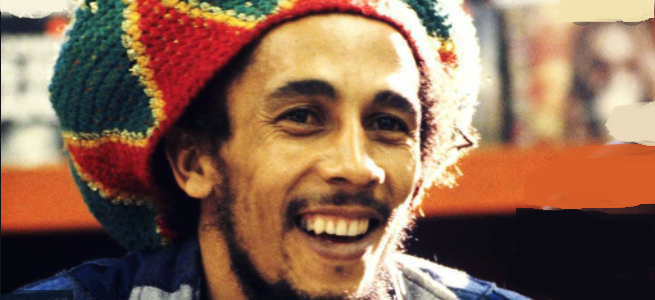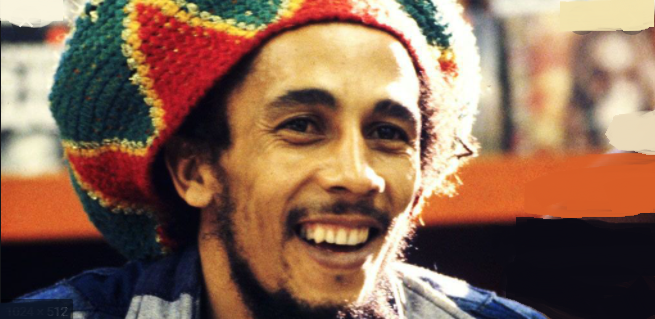
Bob Marley : 76th anniversary

Robert Nesta Marley, Jamaican singer, songwriter, and musician considered to be one of the pioneers of reggae with his distinctive vocal and songwriting style celebrates its 76th anniversary. Born in Nine Miles, a small village in rural Jamaica to Capt Norval Marley a white man a superintendent of lands for the British Government, which had colonized Jamaica in the 1660s. and his mum Cedella, a young black woman, descended from the Cromantee Tribe, who as slaves had staged the bloodiest uprisings in the island’s plantation era. Capt. Marley seduced Cedella, aged seventeen, promising her marriage, and he re-enacted an age-old scenario of white privilege over black service. When Cedella became pregnant, the captain kept his promise but left her the next day rather than face disinheritance. Marley mixed inheritance gave him a valuable perspective, and devoted his life to the cause of speaking to the black diaspora the population throughout the world that had been scattered or colonized as a result of the slave trade and imperialism- but he never expressed hatred for white people. Marley understood that the struggle for power might result in bloodshed, but he also maintained that if humankind failed to stand together, it would fail to stand at all.
In the 1950s Cedella moved to Kingston with her son and made their home in a government tenant yard, in Trench Town, made up of row upon row of cheap corrugated metal and tar-paper one-room shacks, with no plumbing, a crowded area where poor people lived, virtually all of them black. Marley soon found a sense of community and purpose amid rough conditions and rough company, including street gangs, Rudeboys dressed up sharp, acted insolently, and knew how to fight.
Marley soon arrived at Kingston’s burgeoning and eccentric rhythm & Blues scene. In the late 1940s, Jamaican youth had started to catch the fever of America’s urban popular music the earthy and polyrhythmic dance and blues sounds of New Orleans. By the 1960s, Kingston was producing its own form of R&B, a taut, tricky, and intense music in which rhythms shifted their accents to the offbeat. The Jamaican black music survived and evolved as a means of maintaining a community in unsympathetic lands and gave the displaced population a way to tell truths about their lives and a way of claiming victory over daily misery and finding respite.
Marley found qualities of ruthless honesty, courage, and rough beauty in the tenement-yard community, which he wanted to describe its reality and to speak for its populace, which was subject to not only destitution but easy condemnation. He had already written a song about cheap moralism “ Judge Not”, recorded it with one of Kingston’s leading producers, Leslie Kong, and released it in 1963 the same year the Beatles and Bob Dylan were making their music felt. Marley formed a vocal group with his childhood friend Neville Livingston ( the son of Cedella’s boyfriend, who later became known as Bunny Wailer and Peter McIntosh, a tall guitar player who would shorten his name to Peter Tosh. The group with singer Jog Higgs done some work for Clement” Coxsone” Dodd, Kingston’s dominant record producer. Marley and his group called themselves Wailing Wailers and finally the Wailers (the name meant to describe people from the Ghetto) speaking to others who lived in the same straits, acknowledging their existence and voice for their troubles.
Marley’s work ethic entrusted him with rehearsing several of Studio One’s other vocal groups, including the Soulettes – a female singing trio that featured a teenage single mother and nursing student named Rita Anderson. In 1966, Marley and Rita got married, just days before he gave into his mother’s insistence that he come to visit her and try to establish a home in America.
In Jamaica, a cult called Ras Tafari sprang up around the reinstatement o the rightful Jehovah to the earth and a beacon of hope for the world’s long-suffering black diaspora. In the 1930s. Rastafarianism developed as a mystical Judeo-Christian faith with a vision of Africa, in particular Ethiopia, as the true Zion. One of their beliefs was that marijuana – which the Rastas called Ganja was a sacramental herb that brought its users into a deeper knowledge of themselves. Rastas had an apocalyptic vision who saw the western society as the modern kingdom of Babylon, corrupt, and murderous and built on the suffering of the world’s oppressed. Rastas believed that Babylon must fall- and until Babylon fell, according to one legend, the Rastas would not cut their hair. They grew long in a fearsome appearance called dreadlocks. The Rastas lived as a peaceful people who would not work in Babylon’s economic system and would not vote for its politicians.
In 1967, as Marley and the Wailers began recording again, the Jamaican music scene was undergoing another critical change. Marley took to reggae which gave him a new vision and ambition. He wanted to make music that would satisfy and represent his homeland but that would also reach a larger world outside. Marley and the Wailers approached Jamaican-raised Chris Blackwell, the head of Island Record, in England who helped distribute reggae, including the Wailers’ music in the UK for years through the Trojan label and he had invested in the film The Harder They Come, about a Rude Boy singer turned outlaw. It was not until Eric Clapton’s 1975 hit cover of “ I Shot the Sheriff” that a larger audience would begin to notice and seek out Bob Marley.
His 1978 recoded Buffalo Soldier, the title refers to the African-American Soldier in the US cavalry Army regiments, serving in one of several of segregated units under white officers, fighting to obtain freedom they had never known, while the Apaches were fighting to hold onto the freedom they had always had. Although the war against slavery was over, African Americans were far from free, in the period after the US Civil War up to the final racial integration o the US Military, at the end of the Korean War. The Buffalo Soldier’s duties were settling railroad disputes, building telegraph lines, repairing and building forts, and otherwise helping settlers colonize lands violently taken from Native Americans.
Since Jamaica’s independence in 1962, its black population had never been allowed any consequential political power, instead, two dominant parties, the People’s National Party and the Jamaican Labor Party, were run by largely white structures. Marley wanted to see Marley become the next prime minister. Marley received several threats as the concert approached including a warning from the CIA, although a group of vigilantes volunteered to guard Marley’s home but early in the evening of Friday, December 34d, that guard disappeared and at about 8:30 pm, Marley and his group of musicians took a break from rehearsals, two white cars pulled in the driveway and several men with rifles scrambled out and headed for the house and opened fire. When the gunfire was over, something like eighty-three bullets had been expended. Rita Marley had been hit in the head as she tried to flee, the bullet lodged between her scalp and skull. Marley’s manager, Don Taylor, took five shots, including a bullet near the base of his spine. Marley ended up with a bullet grazing his chest and burrowing into his arm, as a shooter aimed at his heart.
Marley fled to a secluded property of Chris Blackwell’s guarded by machete-bearing Rastas. Two nights later, he decided not to bow to any feared dangers and went ahead with the Smile Jamaica show to keep the peace. At the end of his set, Marley lifted his shirt and displayed his wounds. He left the island for a long time, heartsick that fellow countrymen had taken up guns against him, and in some ways, Jamaica was never again his home. There were never any arrests made for the attempt on Marley’s life as police never named any suspects, the case went nowhere.
In 1975, during a soccer match Marley’s foot was badly smashed, and his right toe injury. In 1977, while on tour in Paris, he injured his right toe again as the toenail tore off and the laceration won’t heal. A doctor in London said the damage had turned so bad that the toe could turn cancerous and should be amputated. But an orthopedic surgeon in Miami who performed a skin graft told him the treatment had been successful. Marley did not want to learn that death might be growing inside him. Instead, he concentrated on doing what made life most meaningful to him, making music that might improve the world that he would leave behind.
In 1980, Marley began a lengthy tour, reaching the American black audience that had proved so elusive to him. At New York’s Madison Square Garden, on Saturday, September 20th, Marley almost passed out onstage. He woke up the next day feeling confused, unable to remember clearly what had happened the night before. That morning, while jogging in Central Park with a friend, his body froze up and he fell forward, unable to help himself. His blackout had been due to a Brain Tumor. Later tests revealed cancer had spread through his lungs, liver, and brain, and was untreatable. He probably had ten weeks to live.
Bob Marley died in Miami on May 11th, 1981, aged 36, his body was flown to Jamaica, where the new prime minister Edward Seaga, bestowed Jamaica’s Order of Merit”, one of the country’s highest honours, on Marley a month before his death and ordered a state funeral. On May 20th, 12, 000 people viewed Marley’s body as it lay in state at the Kingston National Arena, and another 10, 000 waited outside.
One of the last things Marley wrote was “ Redemption Song” which he performed in public, as he preached on a stool on stage that night in Pittsburgh, September 22, 1981, accompanied by only his acoustic guitar.
How long Shall they kill our prophets?
While we stand aside and look
Some say it’s just a part of it
We’ve got to fulfill the book.
Won’t you help to sing,
These songs of freedom
Cause all I ever had, redemption songs
All I ever had, redemption songs
These songs of Freedom
He must have known he was singing his epitaph.
